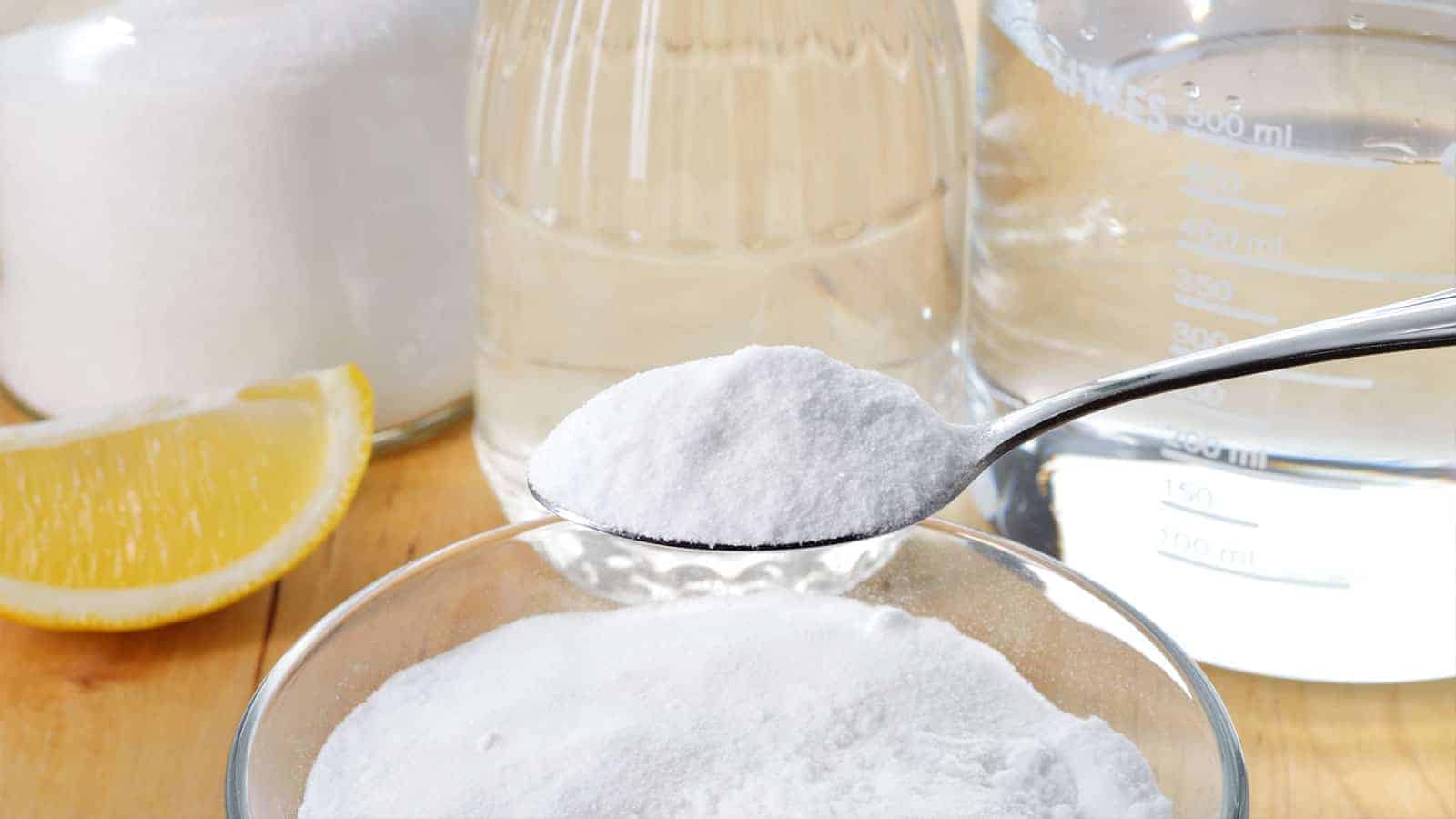Cleaning products are often specialized for one specific purpose, causing you to need to buy many different types for your cleaning needs. Worse still, these commercial cleaners are packed with deadly chemicals that can actually be as harmful to you as smoking a pack of cigarettes every day!
But don’t worry. Keep your positive thinking going! There are completely natural, inexpensive ways to clean your home in a way that is health-conscious. Better yet, all it takes are a few things you likely already have at home. However, if you’re short on time or need professional help, House Cleaning Baltimore MD offers expert services to make your home sparkle while you relax!
Here’s How To Disinfect And Clean Your Home With Only 4 Ingredients
1. Baking Soda
Sodium bicarbonate, more popularly known as baking soda, is a variety of salt, meaning it is a neutral compound, not an acid and not an alkali. However, its pH value is not 100% neutral; it’s a tiny bit higher, which makes it a “basic” compound. The properties that come with this make the component fantastic at cleaning for the following reasons.
a) It Releases Gas
This doesn’t exactly sound like the best thing – and it might even sound a little gross – but this is great for cleaning. Essentially, what this means is that when baking soda reaches a temperature of 300°F or higher, it expels carbon dioxide. That’s why it’s good for baking, for extinguishing grease fires, and for many more applications.
Of course, baking soda is also fantastic for cleaning – specifically for pest control! When consumed by pests, this can cause a buildup of gas within these creatures that leads to organ failure, thus acting as an effective anti-bug method.
b) Odor Absorption
Many people use items such as candles or even air fresheners to reduce stench in a room. But all these items do is make the odors less noticeable – hiding them, in a way.
On the other hand, baking soda actually absorbs bad smells. Most negative odors are acidic, and the basic nature of baking soda allows it to neutralize those low-pH molecules in the air for more positive deodorizing results.
c) Abrasive Features
Abrasive products like baking soda are fantastic for dislodging all sorts of gritty, stubborn particles that can make cleaning your home a living hell. You might think that soap does this job just as well, but soap is designed specifically to be less harsh, so as a base, it lacks the powerful qualities of baking soda.
d) Vinegar Reaction
Vinegar, another item on our list, reacts impressively well with baking soda when it comes to cleaning! We know that a mix of the two can provide an explosive reaction thanks to many a science fair project, and it’s this combination that makes it so potent.
A mix of vinegar and baking soda can easily unclog drains, clean grease and gunk in your home, and leave all surfaces completely sparkling. Not bad for a couple of standard kitchen items!
2. White Vinegar
White vinegar contains high levels of acetic acid. This means that white vinegar, distilled, has an extremely low pH of 2.4, making it more acidic than beverages like orange juice and coffee. As such, it is the perfect cleaner.
Why does this acidity work so well? It is able to fight against a lot of gunk buildup, including soap scum, hard water brine, and glue remnants. It works much more easily and efficiently than many commercial products in this respect.
White vinegar also has highly positive effects on glass of all kinds, as well as other areas where you want to see a good shine. It gets rid of stains and adds a sparkle to countless different materials.
Do note that white vinegar’s extreme acidity means it cannot be used with absolutely everything. It may be bad for flimsy materials, natural stone, and skin. Diluting it with water will make it safer for direct application, but there are other options for cleaning these particular things.
3. Rubbing Alcohol
Known also as isopropyl alcohol, rubbing alcohol is mainly used for healthcare purposes, but it’s also a fantastic cleaner. Here’s why you should add it to your cleaning kit.
a) Disinfectant Properties
Rubbing alcohol is an excellent disinfectant. That’s why it’s often used to clean and treat wounds, and that also means it’s absolutely safe to use around the house. It can sterilize your home, keeping it free from bad bacteria.
b) Gentle and Safe
As we previously mentioned, rubbing alcohol is arguably one of the safest alternative cleaners out there. It is gentle on fabrics, natural stones, and delicate materials, but it is still capable of packing a stain-removing punch and killing unwanted insects.
c) Volatile Properties
This sounds harsh, but it really isn’t! Alcohol is highly volatile, and as such, it dries quickly. This means that it doesn’t leave any residue behind, unlike even water, and you don’t have to worry about the excess alcohol sticking around for longer than a few minutes at a time.
4. Lemon Essential Oil
Lemon essential oil isn’t a “true” essential oil in the sense of the word, but it carries most – if not all – of the same benefits as any other one of these great, pure oils. It is made through the act of cold-pressing fresh lemon rind, leading to a very bright and refreshing scent.
This oil packs an acidic punch that makes it great for brightening parts of the house, furniture, or other items and infusing them with a delightful and strong fresh lemon smell. It is also packed with antimicrobial properties, which make it effective against bad bacteria and other microorganisms that you don’t want around your home.
5. Using These 4 Ingredients In Your Home Kitchen
a) Baking Soda
- Prevent grease stains by dusting a little baking soda onto new splatters of oil or similar ingredients. This will absorb the liquid thoroughly. A short while later, brush the baking soda
- Create a paste from warm water and some baking soda and apply it to grease spots. Use a damp cloth to wipe the area down and scrub it. Use warm water to rinse.
- Make your stainless steel dinnerware and cookware shine with baking soda. Just sprinkle a bit onto a sponge – preferably damp – and scrub the items in question, then use warm water to rinse it off. You can also use a paste of water and baking soda to do this.
b) White Vinegar
- Dilute your white vinegar with some warm water and pour it into a spray bottle. Spray an oven or stove thoroughly. Leave the mix to sit for around 15 minutes. Use hot water to wash off.
- Mop linoleum or vinyl floors clean with white vinegar after diluting it with hot water.
- Get rid of stains from hard water inside your dishwasher with white vinegar. Just pour in one cup of the stuff and allow the dishwasher to run one cycle.
c) Rubbing Alcohol
- Mix water and rubbing alcohol together and pour into a spray bottle. Add sparkle to granite counters by spraying them with this mix.
d) Lemon Essential Oil
- Pour a couple of lemon essential oil drops on a cotton ball. Use this to attack sticky stains left on your counters.
6. Using These 4 Ingredients To Clean Your Home Bathroom
a) Baking Soda
- Mix warm water and baking soda to create a paste, then scrub porcelain with it to bring bright whiteness back.
- Dust baking soda over a toilet bowl after you hit the flush. Leave it on for between 10 and 15 minutes, and then scrub down with the use of a toilet brush. Flush once more and enjoy a clean bowl!
- Put a dash of baking soda onto a rag and use it to wipe down wet areas after you’ve used the shower or bathtub to keep grime at a minimum.
b) White Vinegar
- Wipe mirrors and glass shelves down with water and white vinegar mixed together.
- Soak your tub or sink with a mixture of warm water and white vinegar – just enough to cover the base. After 15 minutes, start getting rid of grime and stains with gentle scrubbing. Drain the liquid, then use hot water to rinse.
- Disinfect your bathroom surfaces and remove bad smells with white vinegar that is completely undiluted. After allowing to soak, wipe the surface down, then rinse off with hot water.
- Dilute white vinegar with water and spray over spots of mildew or mold in vinyl and plastic shower curtains. Wait 15 minutes, then scrub the area and use hot water to rinse.
c) Rubbing Alcohol
- Drop a cotton ball into rubbing alcohol to soak it, then use it to get metallic items shiny and brand new.
- Disinfect your bathtub and shower daily by filling a spray bottle with some rubbing alcohol. Use this to give surfaces a quick spritz after each bath.
d) Lemon Essential Oil
- Pour lemon essential oil onto some clean cloth (lint-free!) and bring the shine back to metallic items by removing stains from products and hard water through gentle cleaning.
e) Combination
- Pour white vinegar and baking soda into a handy empty spray bottle and use to spray down tiled areas. Use a damp cloth to scrub and disinfect, then wash clean with some warm water.
- Clear clogged drains by mixing half a cup of white vinegar with half a cup of baking soda. Tip the mix down the drain in question, cover it up with a glass dish and allow to rest overnight. When you wake up, use hot water to flush out the drain.
7. Using These 4 Ingredients With Laundry
a) Baking Soda
- Yellowing stains or others caused by organic features, such as sweat, can be treated with a water-and-baking-soda paste. Apply it over the area, then carry on with the wash.
b) White Vinegar
- Toss in a quarter cup of white vinegar when doing laundry to get rid of any musty stenches.
- Soak your washing machine by filling it, then pausing and pouring one cup of white vinegar inside to remove hard water stains.
- If your clothes are too stiff and hard, use distilled white vinegar to make them softer. Add the vinegar while the clothes are on a rinse cycle.
c) Combination
- Discolored whites? Don’t lose your positive thinking just yet! Add a mix of vinegar and baking soda at a 1:2 ratio to your next white laundry load.
Final Thoughts On How To Disinfect And Clean Your Home With Only 4 Ingredients
There is so much that you can do with simple ingredients and items. Don’t be afraid to experiment with these four ingredients and see how they can help improve your home-cleaning experience!


















